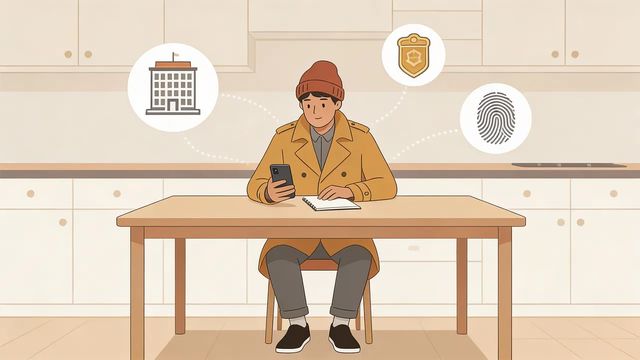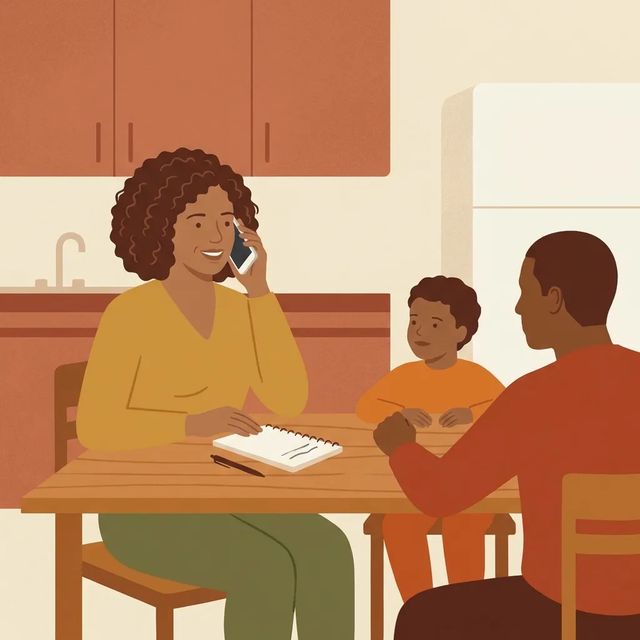Grady County Jail
Explore
Find an Inmate at Grady County Jail
Search for a loved one and send messages and photos in minutes.

Guides for This Facility

Who to Call at Grady County Jail: Quick phone numbers, hours, and when to use each line
Need to reach the right person fast? Here are the key phone numbers for Grady County Jail and the Sheriff's Office, their hours, and when to use each line.
Read Guide
How to Visit Grady County Jail (OK)
Visiting someone in jail goes smoother when you have the right phone number. Here are the confirmed contacts and hours for Grady County, plus a few things to double-check before you head out.
Read Guide
How to Contact an Inmate at Grady County Jail (OK)
Need to reach someone at Grady County Jail? Start with the jail's main phone line. For other matters, use the Sheriff's Office administration or non-emergency lines depending on your situation and the time of day.
Read GuideAt a Glance
Sending Money
- Oklahoma e-Payments accepts payments using a case number, citation number, or payment plan number.
- Online e-Payments are limited to CF, CM, TR, and WL case types (Criminal Felony, Criminal Misdemeanor, Traffic, and Wildlife).
- The Payor Information page requires first name, last name, phone number, payment amount, and an email address to receive a receipt.
Inmate Lookup
- The OffenderWatch portal used by the Sheriff's Office is updated instantaneously throughout the day as offender addresses and other information are updated in the office.
- The OffenderWatch email alert service is free, allows confidential registration of unlimited addresses, and keeps the registrant's email and physical addresses confidential.
- For questions about OffenderWatch or to report compliance information, contact the Sheriff's Office at (405) 222-5085 ext. 287.
Contact Info
- For emergencies in Grady County, dial 911.
- Grady County Sheriff’s Office main phone (Office Administration) is (405) 222-5085.
- The non-emergency dispatch number (405) 224-0984 is answered 24/7.
Facility Info
- Fingerprinting for concealed carry permits and for the general public is available Tuesday–Friday, 9:30 a.m.–11:30 a.m.; payment must be by money order or cashier's check.
- The Grady County public roster/disclaimer page states the facility assumes no liability arising from use of the provided data.
- The Grady County Sheriff’s Office states it is dedicated to fostering a safe, inclusive, and welcoming environment for all.
Based on official sources and community feedback. Learn how we verify
Topic Overviews
Sending Money
Grady County accepts online payments through the Oklahoma e-Payments system. You can pay eligible cases and payment plans using a case number, citation number, or payment plan number. Online e-Payments work for CF, CM, TR, and WL case types (Criminal Felony, Criminal Misdemeanor, Traffic, and Wildlife). During checkout, you'll enter your first and last name, phone number, payment amount, and an email address for your receipt, then provide full billing details and credit-card information. Paying a traffic citation online? You'll need to submit a plea of "Guilty" or "Nolo Contendere" and pay the full citation amount. After payment, the Done page confirms success and offers a printable receipt. Support is available at e-Support@oscn.net (Mon–Fri, 8AM–5PM). If you're trying to add commissary or trust funds, confirm Grady County Jail's approved options before sending money.
Inmate Lookup
Grady County publishes inmate records through the Sheriff's Office OffenderWatch portal. It updates instantly throughout the day as offender addresses and other details change in office records. Want ongoing updates? Sign up for free OffenderWatch email alerts—you can register unlimited addresses, and the service keeps your email and physical address confidential. For help using OffenderWatch or to report compliance information, call the Grady County Sheriff's Office at (405) 222-5085 ext. 287. When searching, use the person's full, correctly spelled name plus their date of birth or age to narrow results and speed up any follow-up calls. State offender lookup tools and custody-notification systems can help with wider searches, but keep in mind that online rosters may be abbreviated and aren't guaranteed accurate.
Contact
For emergencies in Grady County, call 911 immediately—don't rely on office lines for urgent, life-safety situations. For routine or administrative questions about Grady County Jail, call the Grady County Sheriff's Office main line at (405) 222-5085, Monday through Friday from 8:30 AM to 4:30 PM. Need to make a non-urgent report or have dispatch-related questions? Use the non-emergency dispatch number (405) 224-0984, answered 24/7. The Sheriff's Office is located at 302 N 3rd Street, Chickasha, OK 73018. When calling about someone in custody or requesting records, have the person's full name, date of birth, and any booking or inmate ID ready—it'll speed things up.
Read full guideFacility Info
Grady County Jail is a county facility. Oklahoma county jails typically hold pretrial detainees and people serving shorter sentences, so day-to-day policies and services can look different from a state prison. The sheriff's office offers fingerprinting for concealed carry permits and the general public, Tuesday through Friday from 9:30 a.m. to 11:30 a.m. Payment must be by money order or cashier's check only. Using the public roster? The disclaimer page notes that the county assumes no liability for how the data is used, so rely on the official roster for current information. The Grady County Sheriff's Office also states a commitment to a safe, inclusive, and welcoming environment. Schedules, fees, and rules can change—check the county's official page or call before you go.
Common Questions
Showing 6 of 12How do I pay court costs or fines online for a Grady County case?
Pay through the Oklahoma e-Payments portal using your case number, citation number, or payment plan number. You’ll need to complete the Payor Information page and enter full billing and credit-card details, including an email address to receive a receipt.
Sending MoneyCan I pay a traffic citation online in Grady County without appearing in court?
Yes, you can pay a traffic citation online through Oklahoma e-Payments, but you must enter a plea of “Guilty” or “Nolo Contendere” and pay the full citation amount when you submit the plea. Traffic (TR) cases are eligible for online e-Payments.
Sending MoneyWill I get a receipt after paying online?
Yes. After a successful payment, the Done page shows “Your payment was successful” and provides a printable receipt, and you’ll also get an emailed receipt if you entered your email on the Payor Information page.
Sending MoneyHow do I find an inmate at Grady County Jail?
Use the Sheriff’s Office OffenderWatch portal, which reflects office updates instantaneously. Search with the person’s full, correctly spelled name and add their date of birth or age to narrow results and speed any follow-up with the facility.
Inmate LookupCan I get notified when an inmate's address or custody status changes?
Yes. Grady County uses free OffenderWatch email alerts, and you can register unlimited addresses confidentially. The service keeps your email and physical address confidential.
Inmate LookupWho should I contact with questions about OffenderWatch or to report compliance information?
Call the Grady County Sheriff’s Office at (405) 222-5085 ext. 287 for OffenderWatch questions or to report compliance information.
Inmate LookupMore Guides
Ready to Connect?
Search for your loved one to start communicating today
Did You Know?
For emergencies, dial 911. For non-emergency matters call the Grady County Sheriff's Office at (405) 222-5085. Office hours are Monday through Friday, 8:30 AM to 4:30 PM. The office is located at 302 N 3rd Street, Chickasha, OK 73018.
This guide is based on feedback from dozens of families and official facility documentation. Learn how we verify
